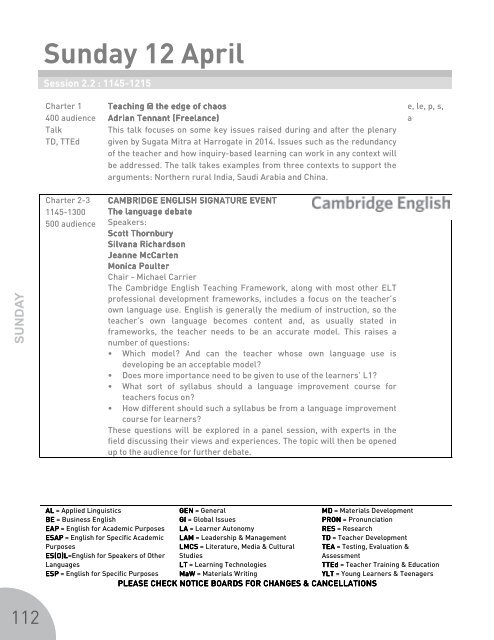Create successful ePaper yourself
Turn your PDF publications into a flip-book with our unique Google optimized e-Paper software.
Sunday 12 April<br />
Session 2.2 : 1145-1215<br />
Charter 1<br />
400 audience<br />
Talk<br />
TD, TTEd<br />
Teaching @ the edge of chaos<br />
Adrian Tennant (Freelance<br />
Freelance)<br />
This talk focuses on some key issues raised during and after the plenary<br />
given by Sugata Mitra at Harrogate in 2014. Issues such as the redundancy<br />
of the teacher and how inquiry-based learning can work in any context will<br />
be addressed. The talk takes examples from three contexts to support the<br />
arguments: Northern rural India, Saudi Arabia and China.<br />
e, le, p, s,<br />
a<br />
SUNDAY<br />
Charter 2-3<br />
1145-1300<br />
500 audience<br />
CAMBRIDGE ENGLISH SIGNATURE EVENT<br />
The language debate<br />
Speakers:<br />
Scott Thornbury<br />
Silvana Richardson<br />
Jeanne McCarten<br />
Monica Poulter<br />
Chair - Michael Carrier<br />
The Cambridge English Teaching Framework, along with most other ELT<br />
professional development frameworks, includes a focus on the teacher’s<br />
own language use. English is generally the medium of instruction, so the<br />
teacher’s own language becomes content and, as usually stated in<br />
frameworks, the teacher needs to be an accurate model. This raises a<br />
number of questions:<br />
• Which model? And can the teacher whose own language use is<br />
developing be an acceptable model?<br />
• Does more importance need to be given to use of the learners’ L1?<br />
• What sort of syllabus should a language improvement course for<br />
teachers focus on?<br />
• How different should such a syllabus be from a language improvement<br />
course for learners?<br />
These questions will be explored in a panel session, with experts in the<br />
field discussing their views and experiences. The topic will then be opened<br />
up to the audience for further debate.<br />
LOGO<br />
AL = Applied Linguistics<br />
BE = Business English<br />
EAP = English for Academic Purposes<br />
ESAP = English for Specific Academic<br />
Purposes<br />
ES(O)L=English for Speakers of Other<br />
Languages<br />
ESP = English for Specific Purposes<br />
GEN = General<br />
GI = Global Issues<br />
LA = Learner Autonomy<br />
LAM = Leadership & Management<br />
LMCS = Literature, Media & Cultural<br />
Studies<br />
LT = Learning Technologies<br />
MaW = Materials Writing<br />
MD = Materials Development<br />
PRON = Pronunciation<br />
RES = Research<br />
TD = Teacher Development<br />
TEA = Testing, Evaluation &<br />
Assessment<br />
TTEd = Teacher Training & Education<br />
YLT = Young Learners & Teenagers<br />
PLEASE CHECK NOTICE BOARDS FOR CHANGES & CANCELLATIONS<br />
112


